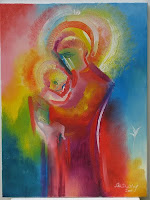 British expressionist Stephen B. Whatley painted this tribute to St. Anthony of Padua on June 13, 2007. “I awoke and on reading my prayers for strengthening I found that not only was it the Feast Day of St Anthony of Padua, 13 June, but also a Friday, the day the Saint died. 777 years ago,” he writes.
British expressionist Stephen B. Whatley painted this tribute to St. Anthony of Padua on June 13, 2007. “I awoke and on reading my prayers for strengthening I found that not only was it the Feast Day of St Anthony of Padua, 13 June, but also a Friday, the day the Saint died. 777 years ago,” he writes.
Nearly every American who grew up Catholic learned a prayer to St. Anthony like this one for times when we couldn’t find our homework or shoes or lunch box. ” St. Anthony, St. Anthony. Please come down. Something is lost and can’t be found.”
What Whatley knows, however, is that the life of St. Anthony was replete with spiritual and emotional loss. Thus, we may ask this heavenly companion to pray for us when we experience loss, including loss in our knowledge of the reality of the Resurrection. “Saint Anthony has felt like a friend,” Whatley emailed me when I wrote to ask about his devotion to the saint. “I have felt his intercession in the simplest things- finding lost things, finding my way – and more profoundly on St Anthony’s Feast Day 2009 I was praying near his statue in church – and exhausted at the time, praying for strength, I felt the most peaceful calm come over me for a few moments; it felt like the Holy Spirit.”
I grew up thinking that St. Anthony was an Italian because of my Italian grandparents’ devotion to this saint. In fact, St. Anthony is Portugese. Fernando Bouillon was born in 1195, 13 years after St. Francis of Assisi. He grew up in a very wealthy Portugese family and, to the great disapointment of his parents, entered the religious order of St. Augustine at age 15. At one point, he was put in charge of hospitality at his monastery. In that role he encountered five Franciscan friars on their way to Morocco to preach the Good News to Muslims.
The men were subsequently tortured and beheaded in Morocco. The bodies of these first five Franciscan martyrs were returned to the monastary in a solemn procession that included the Queen of Portugal.
Fernando decided then to become a Franciscan and to be a witness for Christ in Morocco. He took the name Anthony, after Saint Anthony the Great. But his plan to be a missionary in Morocco did not pan out; several months into his Moroccan sojourn he became severely ill and had to return to Portugal. God intervened in this plan too; his ship encountered heavy winds during sea storms and ended up on the east coast of Sicily.
So then, Anthony planned to join a Franciscan monestary in Sicily, conceal his past and live out his days in quiet contemplation. God had other ideas. St. Anthony attended an ordination and was asked to give the homily. His preaching so impressed those gathered that he was sent to northern Italy to preach. He was a gifted orator, so gifted he became known as the “Hammer of the Heretics,” preaching an orthodoxy of faith to crowds in northern Italy and southern France that became so big he took to preaching in open fields and piazzas.
He died at age 36, and was recognized as a saint within the year because of the dozens of miracles attributed to him. “The saints are like the stars,” St. Anthony once preached. “In his providence Christ conceals them in a hidden place that they may not shine before others when they might wish to do so. Yet they are always ready to exchange the quiet of contemplation for the works of mercy as soon as they perceive in their heart the invitation of Christ.”
How comforting to have the companionship of such a saint, who learned through his own earthly journey what it means to live with loss. May St. Anthony assist us in surrendering our will to the Almighty’s.











